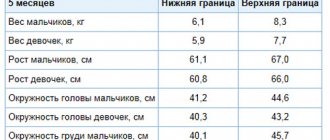During the first few months of a child’s life, a young mother gets used to her new role. She still doesn’t know much, she’s afraid of everything. She has many questions regarding her baby.
For example: “How much should a newborn eat?” or “How long should he eat?” We will try to answer these and some other questions in more detail.
During the day
The three-month-old baby is already more awake and sleeps less. While awake during the daytime, the child studies the world around him, communicates with mom, dad and other relatives, but most often he eats according to his own schedule. The table below shows an approximate feeding schedule for a 3 month old baby.
Approximate feeding time for a baby during the day
| Feeding | Time |
| 1st feeding | from 9:10 to 9:40 |
| 2nd feeding | from 11:20 to 12:00 |
| 3rd feeding | from 15:20 to 16:00 |
| 4th feeding | from 19:00 to 20:00 |
Feeding times can change for a variety of reasons: getting up late, high-calorie foods, illness, and so on.
How much should a child eat at 4, 5 and 6 months?
According to standard calculations by pediatric nutritionists, during the period from 4 to 6 months, infants should eat from 800 to 1100 milk formula per day in the absence of any complementary foods. Moreover, the amount of water babies drink is not calculated in the total volume of food.
If parents actively introduce complementary foods into the child’s diet from 3-4 months of age, the amount of adapted milk formula is reduced to a volume of 700-400 grams per day, and new products appear in the baby’s diet such as: fruit puree, clarified juice, light cottage cheese, egg yolk, pureed vegetable mixtures, liquid milk rice, oatmeal, buckwheat or wheat porridge, fermented milk products - kefir, yogurt.
With a mixed diet, it is better to offer formula milk to the child in the morning and evening feedings. If a child does not fully eat the amount of formula offered to him, he should not be force-fed.
Useful links:
https://youtu.be/lxRMtD7vYUs
Nutritional norms for a newborn at 2 months
It is quite difficult to immediately understand how much milk a child eats at 2 months while being exclusively breastfed. The fact is that at this age the baby is able to control his need for food, and at each feeding he eats as much as is needed specifically at a given moment in time.
If we talk about norms, it is believed that at this age a baby should eat about 130 g at a time, and about 800 g per day, but these numbers may change slightly in one direction or another. Each baby is individual, and at this age, some may eat more, while for others, eating 130 g at once will be too much.
How can you tell if your baby is full?
It is easy to understand that a child is full based on certain signs. During and after feeding, the mother is advised to monitor the baby.
The following indicates that the newborn is full:
- the baby refuses breastfeeding and looks happy;
- the child sleeps soundly and calmly;
- after feeding, the breasts become softer;
- the baby is active and gaining weight well;
- stool 2-3 times a day, mushy, yellow or light brown;
- the child empties the bladder at least 10 times per day.
It should be taken into account that most children under three months of age experience colic. They arise due to the immaturity of the gastrointestinal tract. Characterized by increased gas formation. If there is colic, the baby cries a lot after feeding and sleeps poorly. But that doesn't mean he's hungry.
If the baby is not full, it will manifest itself like this:
- poor restless sleep;
- crying, groaning;
- lethargy;
- low level of activity;
- the appearance of a sucking reflex;
- when the baby is picked up, he looks for the breast with his mouth;
- underweight;
- infrequent bowel movements and urination.
But you need to understand that the signs listed above may indicate the presence of a disease. The pediatrician can determine whether the baby is eating the allotted portion during an examination.
If the child grows and develops normally, this means that the selected dose of milk is optimal. If there are deviations, the doctor will recommend changing the diet and the volume of a single serving.
If there is any doubt that your baby is not getting enough milk, it is recommended to purchase or rent a special scale. By determining the baby's weight before and after feeding, you can calculate the volume of milk consumed for each feeding.
Milk norms in the first 10 days
Many new mothers are interested in how much breast milk a newborn baby should eat. The daily portion of milk depends on the baby’s weight and age. If at first 9–10 ml was enough for the child’s body, then in the next two or three days. the required rate increases to 20 ml, and the daily portion reaches 0.2 - 0.24 l. Every day the dosage for one feeding should be increased by 10 ml, and the daily norm, respectively, by 0.1 l.
In pediatrics, there is a formula for feeding standards for the first 10 days. after the birth of a baby: N (day age of the baby) * 10 = volume of milk calculated for a single feeding. In addition, the required volume of milk for 1 feeding can be determined by weighing the baby before and after breastfeeding. The difference in measurements is the required volume for a single feeding of the baby. It is advisable to carry out this procedure regularly.
Is there enough milk for the baby?
If a mother knows how much a newborn should eat, but is not sure that he is full, the only way to find out is to observe his behavior and condition. The first signs that the baby is eating enough milk is a good increase in body weight. Also, if he has enough food, he will sleep peacefully, without any problems maintaining a 2-hour gap between feedings. The number of bowel movements is at least 3-4 times, depending on the age of the baby - up to 10-14 days he can poop after each meal.
For any mother of a newborn, questions about feeding her baby are of great importance. But a woman should not forget that a lot depends on her nutrition and the correct organization of her feeding regimen. If the mother herself is on a diet, her milk will not have enough fat content, and the baby may remain hungry, even with frequent feedings.
Weight gain as a sign of health
Optimal weight gain and good appetite are the most important signs of normal growth and development of a child. That is why WHO experts paid so much attention to creating a weight table for newborns. This is what pediatricians focus on during routine examinations of children.
If a child is sick, weight indicators, as well as other parameters (head circumference, height) may deviate from the norm. In this case, other signs indicating certain pathologies must be present. If nothing bothers the baby, he feels well and eats normally, then everything is fine with him. If there are significant deviations from standard values, you must visit a doctor.
Artificial feeding
Adapted milk formula from Nutrilon is suitable for artificial feeding of a baby
These formulas are correct both for calculating milk and for calculating the volume of formula, but, if it is necessary to switch to IV, pediatricians often recommend free artificial feeding. This regime implies a flexible feeding schedule. There are several options for free IW:
- The amount of formula and frequency of feeding depend on the child. (Barring obvious overfeeding, of course.) He is healthy and active, and his weight is normal.
- The baby eats at the time he asks, but the amount of food is agreed upon with the pediatrician.
- The frequency of meals is set by the doctor, and the baby eats as much as he wants.
You need to focus on your child's appetite. Is he developing normally, steadily gaining weight and height, but the doctor sees no reason for concern? Rest assured that your child eats as much and as often as he needs.
Calculation of daily norm
Table: how much breast milk a newborn eats, intervals between feedings.
| Monthly age of the baby (months) | Number of feedings per day. (R.) | Breaks between meals (h) |
| 1 — 2 | 8 – 9 | 2,5 – 3 |
| 2,5 — 3 | 7 – 8 | 3 – 3,5 |
| 3,5 — 5 | 6 – 7 | 3,5 – 4 |
| 5,5 – 6 | 5 – 6 | 4 – 4,5 |
| 6,5 — 12 | 4 – 5 | 4 – 5,5 |
Feeding from a baby bottle takes much less time than breastfeeding (about ¼ hour).
| Baby's age (months) | Daily milk volume |
| From ten days. up to one and a half months | one fifth of the child’s weight (0.7 – 0.75 l) |
| 1,5 — 4 | sixth part (0.75 - 0.8 l) |
| 4 — 6 | seventh part (0.8 - 0.9 l) |
| 6 — 8 | eighth part (0.1 - 0.11 l) |
| 8 — 12 | ninth part (0.1 - 0.11 l) |
For example, the weight of a two-month-old baby is 4.8 kg. To calculate the required daily intake, you need: 4.8 divided by 6, we get 0.8 liters. When dividing the obtained indicators by the recommended number of feedings, you can get a portion of milk for one feeding, that is, 0.8/6 = 0.13 liters.
In most cases, artificial nutrition standards are indicated on packages of infant formula. You should also seek advice from your pediatrician.
To calculate the required volume of infant formula for daily feeding in the first month. There are 2 formulas for a baby’s life activity:
- Zaitseva's formula. To do this, you need to multiply 2% of the baby’s weight by his daily age. The obtained indicators must be divided by the number of feedings. Thus, we get the recommended volume of a single serving.
- Finkelstein formula. If the baby’s body weight at birth was less than 3.2 kg, then it is necessary to multiply his age by 70. This indicator will be the daily norm. If the body weight was more than 3.2 kg, then in order to obtain the volume of the daily portion, you need to multiply the baby’s daily age by 80.
How to check the amount of food you eat
When a baby is fed formula, it is easy to find out how much he eats - you just need to subtract the amount left after from the amount of food that was before feeding.
It's more difficult when breastfeeding. For this you will need a baby scale. It is advisable to take electronic ones - they show the exact weight and are convenient to work with. The newborn is weighed before feeding (it is advisable to record how much he weighs), then he is fed and weighed again. Subtract the difference in the child's weight and find out how much he eats. There is another way - to express breast milk and feed it from a bottle.
How much water should a newborn drink?
According to standards and recommendations, breast milk can completely cover the need for water consumption. However, this is only relevant before the introduction of complementary foods. It is imperative to give your baby water if he has diarrhea, vomiting, the weather is hot outside, or the baby has an elevated body temperature. In the first four weeks, the baby should drink about 35 milliliters of water per day.
In this article, we discussed with you a number of very important issues that relate to feeding a newborn. Namely: “How many grams of formula should a newborn eat?”, “How to understand that the baby is full?”, and also “How to calculate the amount of formula for a newborn?”, etc. We hope you have received all the information you need.
It should be recalled that if you doubt whether your child is full or hungry, and also cannot calculate the norm yourself, be sure to contact your pediatrician. Remember that a child must have a balanced diet for active development.
How many times does a little person eat?
After the mother and newborn arrive home, the process of adaptation to new living conditions begins for both the woman and the newborn. In the first days there may be some difficulties. The mother needs to care for and feed the baby, without neglecting her breasts, and constantly pump so that problems do not arise. Sometimes when applied to the breast, the mother may feel discomfort; why this happens, you can find out from the article: “Breast pain during feeding: possible causes, their elimination + prevention of chest pain.” A newborn, in turn, although he has an instinctive sucking reflex, he is not always able to suckle at the breast. Therefore, these two closest people need to “get used to” each other, establishing the feeding process. You can read “The First Days After Childbirth” about how a woman’s life changes after the birth of a child.
How often does a newborn eat while breastfeeding?
After birth, the little person’s body begins to function in a new way.
For development, which occurs at a rapid pace in the first year of life, it needs nutritional elements that are rich in breast milk. There is a newborn in the first days, maybe every 2-4 hours, so it turns out that there are 12 feedings per day. Soviet pediatricians recommended that our mothers let their newborns eat by the hour, but today it has been proven that such tactics are wrong; the child should eat “on demand” no matter how many feedings the mother has. If you have problems with lactation, then the article will be useful to you: “How to increase lactation.”
Also, mothers have a pressing question: how long to keep a newborn at the breast? Everything is quite simple until it gets pumped. But you shouldn’t let her eat for more than 20–25 minutes, because after that, the mother’s nipples will crack, which will complicate the feeding process for two participants.
The mother needs to ensure that the baby actively sucks the breast and does not use it as a pacifier.
How many times does a formula-fed newborn eat?
More than half of children in the modern world are bottle-fed. The reason may be:
- Caesarean section operation;
- premature birth;
- lack of milk after the birth process;
- allergic reactions to lactose in babies.
Formulas cannot replace breast milk 100%, but manufacturers try to bring it as close as possible to breast milk in composition. Special rules apply for artificial formula babies; the statement “feeding on demand” does not apply here. Artificial ones can eat after 3-4 hours. The pediatrician will give the first recommendations upon discharge, taking into account the child’s condition, activity, and weight.











